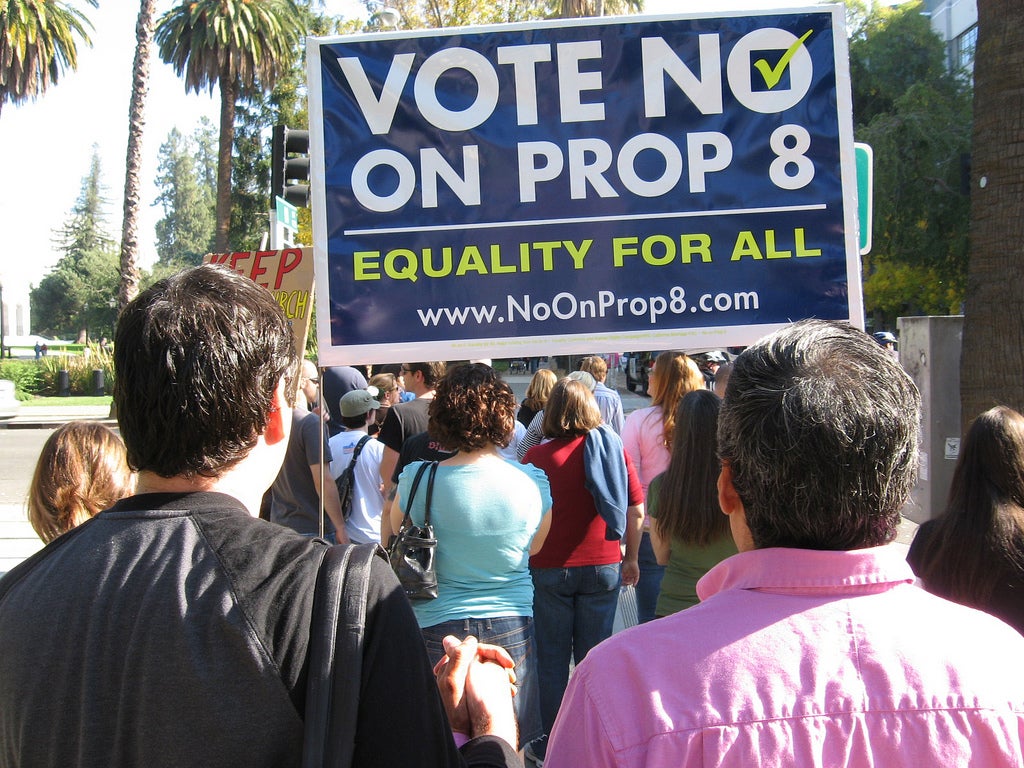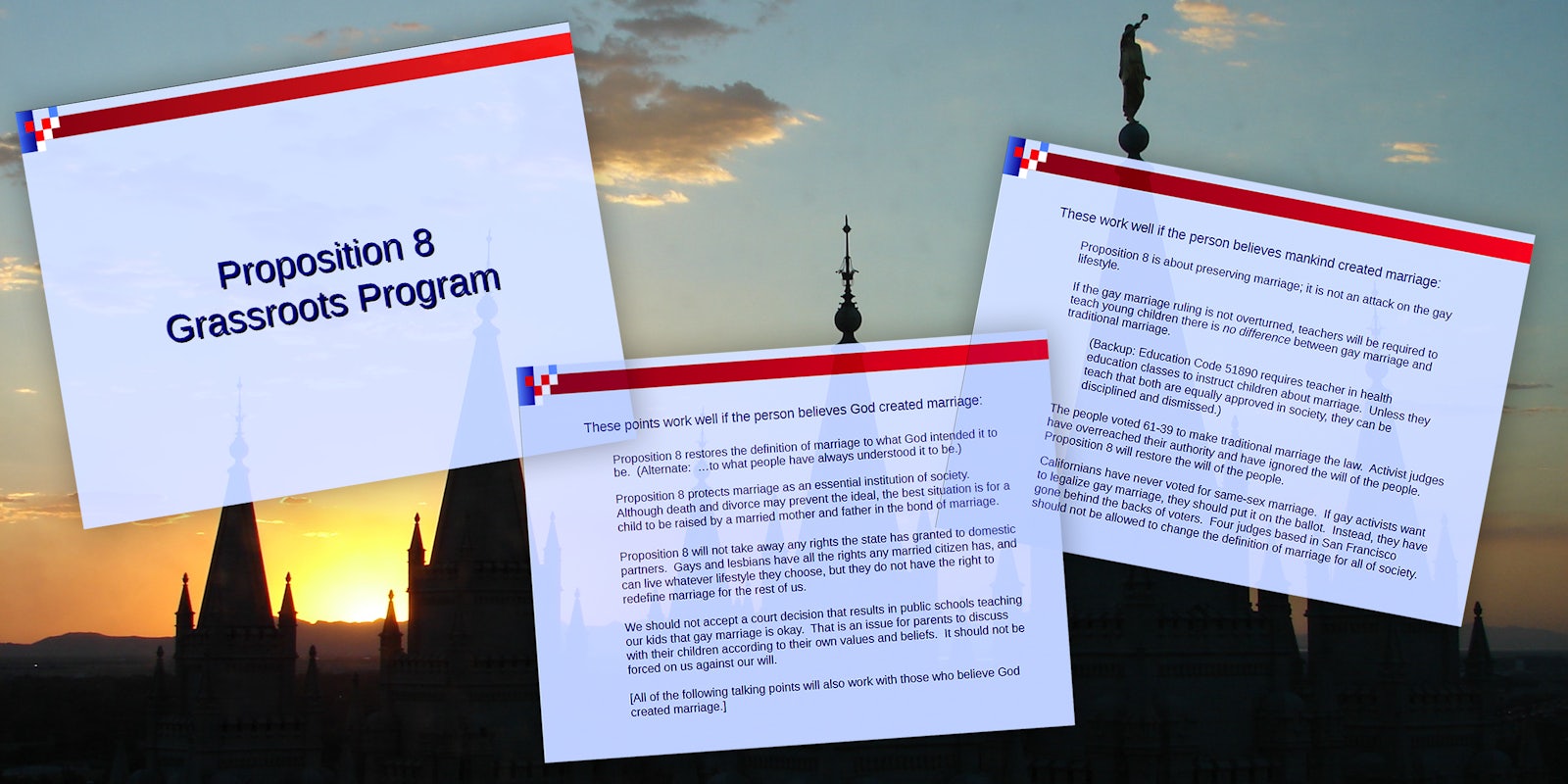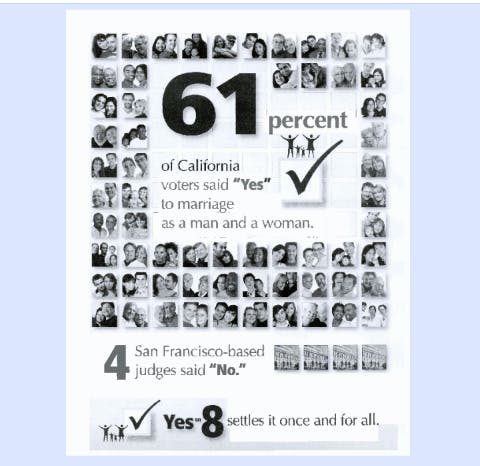Matthew McGuffin was just 25 when he was “called.” McGuffin had recently returned to his congregation after years away from the Church of Jesus Christ of Latter-day Saints (LDS), more commonly known as the Mormon Church. The bishop of his ward approached him, saying that God’s plan for him was to be a community outreach organizer for Arcadia, California. This meant spreading the word about Proposition 8, a voter referendum striking down same-sex marriage in the state.
McGuffin wasn’t a political person. This was 2008, and he didn’t know much about Prop 8. After he went home to learn about the effort, McGuffin claims his duties often made him “uncomfortable.”
“We were asked to organize meetings with Senior Living Centers—to go in there and register people to vote, teach them about the voting process, and then ambush them at the end by giving them Prop 8 material,” McGuffin said. “When I was asked to do this over the phone, I wrote an email back saying that I wasn’t comfortable going in with a hidden political agenda.”
When community outreach didn’t work out, McGuffin alleges he was asked to man a phone bank in a little house owned by the LDS Church located near Humboldt State University. McGuffin says that volunteers would bring their own computers and cellphones, calling hundreds of people to convince them that voting “Yes on Prop 8” was the right thing to do. Although they were in no way forced to help out, church leaders would often come by and bring the volunteers pizza to incentivize the long, mundane hours spent by the phone.
“I didn’t want to participate, but when you’re told by a prophet this is what you should do, it takes away choice a little bit,” McGuffin said. “It was an incredible organizational effort. I’ve never seen anything like it.”
. . .
New documents released by the transparency website MormonLeaks allege that LDS leaders did more than give their members pizza to encourage them to volunteer: The church’s leadership was directly involved in ongoing efforts to block marriage equality. And it continues to advocate for discrimination against the LGBTQ community, here and abroad, even despite recent attempts to build bridges with queer people.
“I didn’t want to participate, but when you’re told by a prophet this is what you should do, it takes away choice a little bit.”
Training materials, presentation documents, and emails shared exclusively with the Daily Dot suggest even stronger ties between the Mormon Church and anti-marriage efforts than what has previously been alleged. After conservatives successfully passed Prop 8, a report from the Wall Street Journal claimed that the LDS Church provided volunteers and financial donations to the campaign. But the new materials suggest that the effort was directly supervised by members of the Church’s Quorum of the Twelve Apostles, its highest leadership board.
“This was not known concretely before,” ex-Mormon Ryan McKnight, who founded MormonLeaks last year, told the Daily Dot. “I was always given the impression that it was more of a local effort sanctioned by the top brass without them being directly involved.”
Titled “Proposition 8 Grassroots Program,” a PowerPoint presentation leaked to the site was what leaders used to train supervisors assigned to man phone-banking and door-to-door efforts. An organizational chart in the document suggests that Elder John C. Dalton, a member of his area’s Quorum of the Seventy, directly facilitated political organizing for Prop 8, serving as state chairman. In his role, Dalton oversaw campaign leadership, as well as communicating with bishops and the presidents of local stakes, the LDS term for a group of churches that share the same district.
Directly supervising Dalton were two members of the Quorum of the Twelve Apostles: Elders M. Russell Ballard and Quentin L. Cook. L. Whitney Clayton, senior president of the Presidency of the Seventy, also served as his superior.
On Oct. 28, 2008, Dalton reached out directly to the team just days before the campaign to wish them luck and tell volunteers to press onward. It is this email that speaks directly to these leaders’ direct involvement in Prop 8 organizing.
“We have been able to make hundreds of thousands of phone calls, rallies, bus tours, outreach programs on campuses and a host of other community activities,” Dalton wrote. “And all this has been done by your volunteer efforts and the members of your wards, branches, and institutes. I congratulate you on your dedication and faithfulness. Each evening as Elder Clayton and the statewide leadership conference call on Prop 8, you are uppermost in our minds and hearts. How proud we are to be associated with all of you.”
The “Operations Manual” for the Prop 8 campaign further points to constant contact between elders and local churches to compel voters to show up at the ballot box that November. The manual, which was specifically for the Santa Monica area, opens with a quote from Edmund Burke—which was previously invoked by President Gordon B. Hinckley in a speech condemning pornography and “sex perversion.” It offers a statement of purpose for the campaign: “All that is required for evil to triumph is that good men do nothing.”
That document advises regional coordinators with the Prop 8 effort to check in with bishops to “remind them to keep informing their congregations of the importance of and need for volunteers.” It also emphasizes that bishops should approach individual members and tell them to get involved in the campaign, whether as “walkers” (people going door-to-door) or “phoners” (those in the call centers).
Although the church’s rhetoric is often more neutral than one might guess, it just as frequently reverts to the idea that same-sex marriage is evil.
On a slide titled “Myths and Facts,” the LDS Church states that the effort is not intended as a strike against the LGBTQ community but meant to uphold a universal definition of marriage. “Every culture in the world believes that marriage is between a man and a woman,” it reads. “Californians from all walks of life and ethnic backgrounds, whether religious or not, agree that marriage is between a man and a woman.”
That statement might be dubious, but it’s hardly fire and brimstone. The very next slide, though, adds: “If Proposition 8 is defeated, the sanctity of marriage will be destroyed and its powerful influence on the betterment of society will be lost.”
These PowerPoint slides are similar in tone to earlier reporting on the campaign in the Wall Street Journal as well as the New York Times. They also foreshadow how the Republican right would spend the next decade framing the fight against LGBTQ equality.
When discussing how the California Supreme Court struck down Proposition 22, a constitutional amendment that first banned marriage equality in the state, the presentation argues: “Activist judges have overreached their authority. Proposition 8 will restore the will of the people.”
. . .
Claims of “overreach” are extremely similar to conservative rhetoric in the current debate over appropriate bathroom access for transgender people. After the Obama administration’s “Dear Colleague” letter advised schools to allow trans students to use facilities that match their gender identity, then-North Carolina Gov. Pat McCrory, who went to pass the state’s notorious anti-trans bathroom bill, called the decision “federal overreach.”
The Mormon Church effectively sided with him. Last month, LDS leaders filed an amicus brief against trans students in the SCOTUS case Gavin Grimm v. Gloucester. “Sustainable results will be more likely achieved if citizens and lawmakers are left free to address gender identity in ways that preserve the nation’s priceless heritage of religious freedom,” stated the brief, which was signed in conjunction with leaders from National Association of Evangelicals and the U.S. Conference of Catholic Bishops.
The Supreme Court ultimately declined to hear the case, arguing these issues should be left up to states to decide.
A 2015 LDS policy elevated same-sex marriage as an offense “higher than murder, higher than sexual abuse, and higher than pedophilia.”
Though the LDS Church has been taking steps toward LGBTQ inclusion since the fallout over Prop 8—when widespread backlash led to many Mormons leaving the faith—the amicus brief was a reminder that things have stayed the same as much as they have changed.
In November 2015, McKnight helped leak an internal document introduced by the church branding Mormons in same-sex relationships as “apostates.” Getting married to a person of one’s own gender would automatically trigger a disciplinary hearing, one leading to likely expulsion from the church. John Dehlin, the host of the Mormon Stories podcast, said that the policy elevated same-sex marriage as an offense “higher than murder, higher than sexual abuse, and higher than pedophilia.”
“In the church’s own policy manual, rape and murder do not immediately trigger a disciplinary council,” Dehlin said.
The November policy speaks volumes about its internal struggle to move forward. The decision also prevents the children of same-sex couples from being baptized until they turn 18. In order to be blessed in the church and become Mormon, they must publicly renounce their parents’ marriage, effectively breaking up their family.
“It basically threw in the toilet Christ’s admonition to never suffer the children to come unto him and to never turn them away,” explained Dehlin, who was excommunicated in 2015 for his support of marriage equality.
The former Mormon claims that following Prop 8, the church has largely shifted to a “defensive posture.” Rather than going on the offensive against LGBTQ people—by openly campaigning against their rights—LDS leaders have focused on the preservation of so-called “religious liberty,” another term that’s often used by conservatives as a means to discriminate. The 2015 equal rights ordinance, for instance, was criticized by advocates for a provision that provided ample leeway for faith groups to discriminate against LGBTQ people in the name of the free exercise of religion.
. . .
So the question remains: Is the LDS Church of today all that different from the one that helped strike down same-sex marriage in California nearly a decade ago?
Robbie Pierce, a reporter who covers the Mormon Church for the LGBT magazine the Advocate, agrees with McKnight that the church tends to exercise “soft power” in the wake of the Prop 8 controversy. Like McGuffin, Pierce was an active member during the height of that campaign. He remembers Mormon leaders in Utah asking members to “send messages and emails” or donate their time by phone banking against same-sex marriage. Local members of the church would call voters in California to remind them to get out on Election Day.

“These efforts may not be as powerful as they once were politically, but the ideas behind them are powerful in people’s individual lives, and that’s dangerous,” he said.
In 2016, leaders in the LDS Church urged Mormons in Mexico to fight against marriage equality in Mexico after President Enrique Peña Nieto vowed to pass a law legalizing same-sex unions. Last June, representatives from the church’s Area Authority read a letter at local congregations warning against the further spread of marriage equality in the country. “The family is ordained of God and marriage between man and woman is essential to his eternal plan,” the message read.
It went on to instruct Mexicans to “promote those measures designed to strengthen the family and to maintain it as the fundamental unit of society,” which included “[uniting] our voices with those of other citizens exercising our rights as are contained in the Constitution of the United Mexican States, which establishes and honors freedom of religion and expression of beliefs and thoughts, both publicly and privately.”
The newsroom for the LDS Church in Mexico reported that letter was read at more than 2,000 Mormon congregations in the country. There are reportedly 1.4 million LDS members in Mexico.
Pierce said that population may seem small in a country with over 122 million people, but the LDS Church is a “more significant power” in the Spanish-speaking nation than many people might expect. The church’s influence in Mexico, which was the target of early missionary work dating back to the days of Brigham Young, was evidenced by a September protest in which thousands of demonstrators marched against same-sex marriage across the country. These marches, which were endorsed by the Pope, took place in at least 16 cities.
Nieto’s push for equality failed following the backlash. “The Mormon Church isn’t running the government, but it is definitely influencing what’s going on down there,” Pierce said.
Although McKnight claims that the Mormon Church of today preaches “political neutrality,” the reality is often very different. The most recent issue of Ensign, the official magazine of the LDS Church, refers to marriages between people of the same sex as “counterfeit.” An essay titled “The War Goes On,” which was written by Elder Larry R. Lawrence, claims that these unions “bring neither posterity nor exaltation.” Lawrence adds, “They cannot bring lasting happiness.”
If these viewpoints have continued to impact how the church organizes politically, McKnight hopes that leaking these documents will start a necessary conversation on where Mormon leaders stand today.
“I don’t really care about Prop 8,” McKnight said. “It’s a non-issue thanks to the Supreme Court’s 2015 decision on Obergefell v. Hodges. The value in the document goes beyond Prop 8. An organization like the church, if you’re going to be involved in politics, I think they need to be open and honest about the extent, scope, and nature of that involvement. It’s important to see how the church operates or is willing to operate in these situations. In 2008, it was Prop 8. What’s it going to be in 2017? I don’t know.”
The Daily Dot reached out to the spokesperson for the LDS Church, who did not return request for comment.



